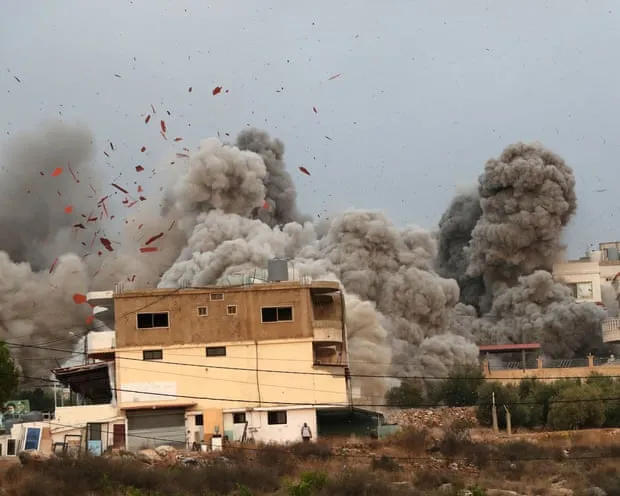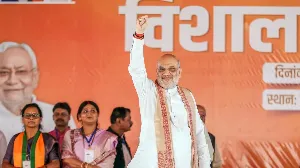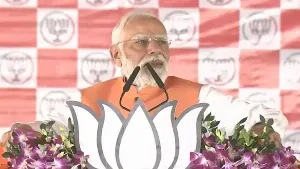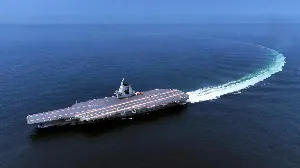Escalating Israeli Strikes on Southern Lebanon Heighten Tensions

Israeli military forces have intensified airstrikes across southern Lebanon, resulting in at least one fatality and several injuries. These attacks have drawn strong condemnation from the Lebanese government and the armed group Hezbollah, marking a significant escalation in tensions amidst a fragile ceasefire that has been in place for nearly a year.
On Thursday, Israeli warplanes targeted locations in the Tyre district, specifically striking the towns of Toura and Tayr Debba. The Lebanese National News Agency reported that a Lebanese man was killed and nine others were injured when residential areas were hit. This series of strikes has raised alarm, as it violates the ceasefire agreement established in December 2024, which was intended to halt hostilities between Israel and Hezbollah.
The Israeli military stated that the strikes were aimed at alleged Hezbollah military installations, accusing the group of failing to disarm as stipulated by the ceasefire agreement. Despite the truce, there have been near-daily strikes by Israel, which Hezbollah claims undermine the ceasefire, asserting their right to defend themselves in the face of ongoing aggression.
Lebanese President Joseph Aoun characterised the Israeli strikes as a violation of international humanitarian law, highlighting the targeting of civilians and the distressing impact on local communities. He expressed concern over Israel's continued military actions, which he believes threaten any potential for a negotiated resolution between the two nations.
Hezbollah has maintained its commitment to the ceasefire but insists it will not disarm while Israel persists in its attacks on Lebanese territory. In a statement, the group reaffirmed its right to self-defence and condemned any political negotiations with Israel, which they argue do not align with Lebanon's national interests.
The United Nations Interim Force in Lebanon (UNIFIL) has voiced concerns over the Israeli actions, stating that they jeopardise the safety of civilians and hinder the Lebanese military's efforts to control unauthorized military assets in the region. UNIFIL called for restraint and emphasised the need for a political solution to the ongoing conflict.
The United States has been pressuring Lebanon to take stronger steps towards disarming Hezbollah, yet has been less vocal about Israel's ongoing violations of the ceasefire. The situation remains tense, with both sides positioned for potential escalation. Israeli leaders, including Prime Minister Benjamin Netanyahu, have indicated a willingness to intensify military operations in response to perceived threats from Hezbollah.
Many observers believe that the recent strikes serve as a message from Israel to Hezbollah, particularly following an open letter from the group to Lebanese leadership, which reiterated their commitment to resistance against Israeli actions. The ongoing exchanges highlight the complex dynamics within Lebanon, where internal divisions complicate the disarmament process.
As Lebanon grapples with the fallout from these attacks, President Aoun has directed the Lebanese army to formulate a response to any further Israeli incursions, signalling a potential shift in the Lebanese military's role in the conflict. In the past, the Lebanese army has largely refrained from direct confrontation, but the rising tensions may compel a reassessment of its strategy.
The backdrop to these developments is Lebanon's historical conflict with Israel, which remains technically ongoing, with the two nations engaging only through a United Nations-mediated mechanism. The ceasefire agreement requires that Hezbollah disarm in southern Lebanon by the end of this year, a goal complicated by Israel's alleged exploitation of Lebanon's political vulnerabilities.
The Israeli military's operations in Lebanon are part of a broader strategy that includes similar actions in Gaza, where ceasefire agreements have not halted Israeli strikes, leading to civilian casualties and humanitarian concerns. Observers note that Israeli officials have the latitude to interpret ceasefire violations and respond accordingly, creating a cycle of violence that undermines diplomatic efforts.
With both Israel and Hezbollah reaffirming their positions, the prospect for a peaceful resolution appears increasingly distant. The situation is further complicated by internal Lebanese politics and the influence of international actors, particularly the United States, which continues to navigate its role in the region amid rising tensions.

Amit Shah Warns Bihar Voters Against Opposition in Election Rally

Prime Minister Modi Criticises Bihar Opposition at Aurangabad Rally

China's Fujian Aircraft Carrier Enters Service Amid Naval Expansion

New US Visa Guidelines Impact Applicants with Health Conditions





